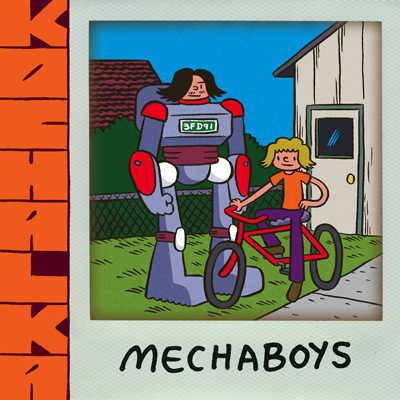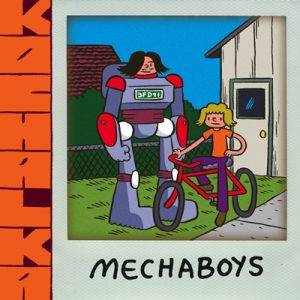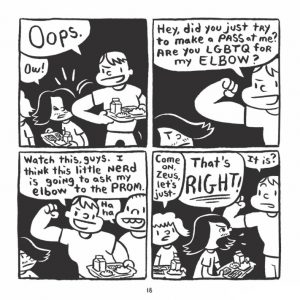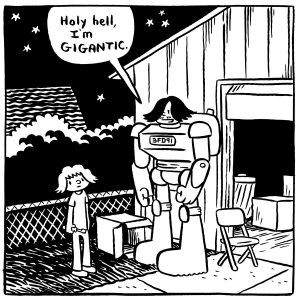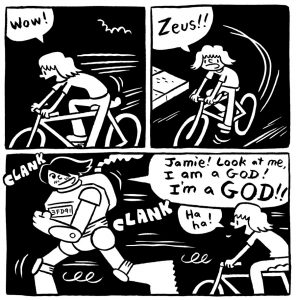James Kochalka is one of a handful of hyperproductive cartoonists working in small press comics. His recent output has rotated between Johnny Boo comics, which target a younger subset of readers, and comics like Superf*ckers Forever, which are more teen & adult oriented. Kochalka’s latest graphic novel Mechaboys is firmly in that later camp. Published in April by Top Shelf, Mechaboys is a story of two teenagers building a wearable robot suit to beat up bullies/wear to prom/destroy their high school.
The two protagonists of Mechaboys are Jamie and Zachery, your typical teenage smallfry. Both are picked on a school by jocks named Duck and Truck (yes, seriously), but Zachery has bigger plans. In Jamie’s garage, the two teens are building a secret weapon; a mechanized suit made out of a lawnmower and spare parts. Initially, it’s an antibullying weapon, an equalizer of sorts. But soon the goal for the mech suit takes on a more sinister turn when Zachery gets hurt in the mech’s second outing.
Kochalka’s cartooning is traditionally spare black and white drawings, and that trend continues with Mechaboys. The book is quick, partially due to Kochalka’s simple designs and partially because of how well each page is illustrated. The cartooning is energetic, and it’s easy to read the emotion and action of each page. Unlike previous books, Mechaboys is a 7”x7” square, which makes page layouts extremely simple. Each square page is subdivided into 1 to 4 panels, and that simple construction tends to increase the narrative speed of Mechaboys.
Once you stop looking at Mechaboys and start reading it, the book starts to lose its luster. The main characters are particularly tough to read. Zachery (who proclaims he must be called Zeus at the beginning of the book) is a psychopath with a nearly-there mustache. He is manipulative and callous with no appreciable empathy or regard for others. Jamie, his “friend,” is a milquetoast blonde who is manipulated into promising to murder the entire Senior prom with the mech. (Zachery would have done it himself, you see, but was hurt piloting the mech at an illicit teen drinking party). This pairing of the hyper-aggressive asshole and his mild-mannered friend is played for laughs, but it’s not really that funny. The lack of nuance and depth to the character writing is unfortunate and the overall effect is that both characters are boring.
Sadly, the plot isn’t that much better than the characters – Mechaboys feels more like a collection of plot beats than an actual story.The connective tissue that holds this book together is insubstantial at best, and the integration of the main villain (non-Zachery villain, at least) into the storyline is bizarre. The poor plotting is largely hidden by Kochalka’s slick cartooning – this book reads so fast that it’s easy to gloss over the gaping holes.
The overarching thematic point of Mechaboys is an observation of the American obsession with violence. Zachery comments on the planned prom massacre, saying, “It will be like Columbine meets Robocop.” If anything works in Mechaboys, it’s Kochalka’s point here. Violence is something that is bought and sold in America; our major cultural touchstones are billion dollar movies where men with super powers punch each other to death. Robocop is fitting portrayal – emotionless cop guns down “the bad guys,” with remarkable computerized efficiency. It’s with a nod and a wink from Kochalka that this exact same violence is bought and sold in Mechaboys, albeit a little goofier than usual. At the same time, Kochalka points out the human cost of this obsession with violence vis a vis Columbine. I find it remarkable that Kochalka can write this dialogue into a book, I can read it, and not feel anything except tiredness. School violence and shootings are increasingly common, and while Kochalka’s joke is in poor taste, his “designed to offend” comment is unsurprisingly hum-drum. It’s a reminder of how desensitized this nation is to the pain and suffering of others, even in the wake of the Marjory Stoneman Douglas shootings.
In other ways, Mechaboys is surprisingly puritanical. Kochalka censors most of the swear words in Mechaboys, replacing them with phrases like “Sugar F. Christmas,” or “bullsugar.” That swear word censorship is mixed in with some more biting jokes at the expense of the LGBTQ community, which is a head scratcher. Is this Kochalka making more commentary on the nature of America? Hard to say. Regardless, it’s a mix of juvenalia, crudeness, and silliness that never gels.
Perhaps most frustrating are Kochalka’s end-of-book twists. Kochalka writes his way out of a sticky situation with the proposed school massacre by turning the prom into a mech vs mech fight in the school gymnasium. The result of this narrative contortion is that Kochalka gets to walk away from Mechaboys without needing to say anything at all. What could have been a relatively serious meta-commentary turns into a silly nothing by turning the entire prom into a fist fight at the end of the book. It’s a frustratingly facile ending.
Overall Mechaboys feels slapdash. The plotting is all over the place and the two main characters are an unlikeable mess. Kochalka vacillates between silly/sweet and dumb/mean. The result is an uneven comic that tries to be dumb funny, but ends up just being dumb.
Sequential State is made possible in part by user subscriptions; you subscribe to the site on Patreon for as little as a dollar a month, and in return, you get additional content; it’s that simple. Your support helps pay cartoonists for illustration work, and helps keep Sequential State independent and ad-free. And if you’re not into monthly subscriptions, you can also now donate to the site on Ko-Fi.com. Thanks!

